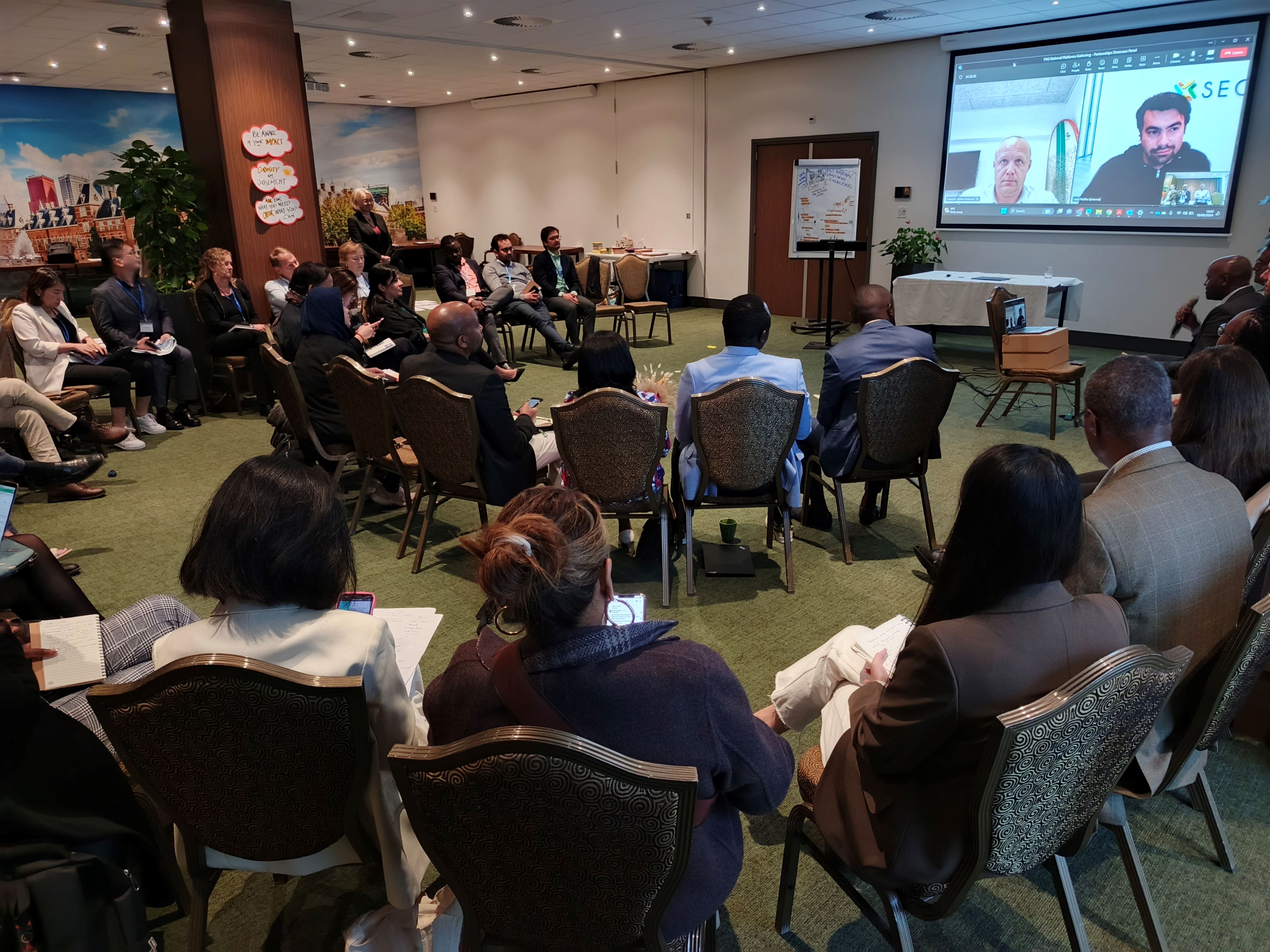Three P4G Partnerships Share What Startups Need to Become Investment Ready

Subject
P4G Partnerships
Country
Publication Date
2024-07-11
Partnership
Prosperous Forests , African Bamboo – Solidaridad East Africa , SEOS,
About
“Go back to the fundamentals of why a startup is built… it’s to solve a problem.” - Juan Pfeiffer, Founder and CEO, SEOS Energy.
On June 19-21, 2024, P4G convened its National Platforms Gathering in The Hague, Netherlands. The event brought together members from P4G’s nine partner country National Platforms to discuss their diverse experiences supporting small- to medium-sized enterprises as they seek to attract investments and advance green business growth.
In the session “Partnerships Showcase & Learnings from the Field,” panelists representing three P4G partnerships, Khalid Duri, Founder and CEO, African Bamboo; Juan Pfeiffer, Founder and CEO, SEOS Energy; and Sebastian Nielsen, CEO, Slow Forest, shared how they are strengthening their business models to become investment ready. These leaders highlighted how support and interventions from P4G and its National Platforms were pivotal to their success and what more is needed to build business ecosystems that help startups thrive.
FOSTERING PEOPLE-FIRST SOLUTIONS
For Sebastian Nielsen, Slow Forest’s challenge started with better understanding the relationship between coffee and the community. “Every time we drink coffee we're destroying the climate, removing nature and keeping farmers in poverty,” he said. Slow’s business model focuses on adding circularity into a broken value chain by working with smallholder coffee farmers to harvest, process and sell directly to consumers.
This model helps farmers receive and retain better prices for their beans, ensuring that this value is redistributed back into the value chain and into the community. Slow Forest partnered with WWF and received P4G funding to conduct feasibility studies for scaling and replicating the model in Indonesia, Vietnam, Ethiopia and Laos. These studies showed that there was a great opportunity to replicate this model in Indonesia, so Slow Forest set up and expanded this project into chocolate and cocoa production. It also allowed Slow Forest to team up with WWF Vietnam to implement this model in the Huong Hoa district of Quang Tri province.
BUILDING CREDIBILITY AND DE-RISKING GREEN INVESTMENT
“We need to have a different investment profile, and we need to have another perspective on what traction is.” - Sebastian Nielsen, CEO, Slow Forest.
Another challenge identified was the chicken-egg scenario in fundraising. SEOS Energy CEO Juan Pfeiffer highlighted how there is great demand for rooftop solar adoption in Colombia, however, it was not translating to funding. SEOS offers a financing platform to advance rooftop solar in Colombia. While there is high demand, SEOS couldn’t acquire a loan to service this demand because it did not have the capital. And it couldn’t secure capital because the investors wanted a bigger portfolio of customers.
In 2023, SEOS closed its pre-seed round. With a P4G grant secured, it was able to unlock further equity from other investors. Additionally, the backing of National Platform partners in Colombia gave SEOS the credibility and authority it needed to draw attention to gaps in climate finance and advocate for greater funding.
For African Bamboo, the technical support they received allowed them to build a risk tool and financial model that is informative and dynamic.
“Climate start-ups must look at how they manage risk, how they present the risk they want to pass on to investors and if that risk is something the investors are willing to live with,” said Khalid Duri.
African Bamboo developed a robust bamboo forest management plan that demystified its technical capacity to manage bamboo and built transparent mechanisms that create higher value for bamboo. A key step for a company who has pioneered technology and a manufacturing process for the large-scale production of bamboo-based building products.
As Khalid noted, when investors see that the risk element is well managed, they have the confidence to bet on startups.
OVERCOMING POLICY AND REGULATORY HURDLES
Both Juan and Khalid mentioned the support of the National Platforms in Colombia and Ethiopia respectively in advocating for the startups’ needs when it came to policy and regulatory needs.
In Colombia, the support of the Department of National Planning was instrumental in getting other stakeholders. As a result, SEOS Energy was one of only seven financial technology companies to secure a guarantee from FNG, the National Guarantee Fund in Colombia, and the only one doing climate. Juan shared how National Platforms can help build capacity among other stakeholders to understand and support projects like theirs so traditional venture capitalists see them as less risky.
In Ethiopia, forestry regulations posed a barrier to entry and scaling for sustainable forestry projects. African Bamboo contributed recommendations to new regulations – many of which were taken on by the Ethiopian National Platform government co-chair led by the Ministry of Planning and Development. As a result, the country has new regulations that are broader and will attract new investors.
From seeing themselves listed on the stock exchange to being critical knowledge drivers who can enable other climate startups, all three leaders had ambitious and impact-driven visions for the future.
Sebastian offered an important takeaway for stakeholders interested in supporting startups, “Help the very early startups take some risks and accept that the metrics for evaluation will be different.”
